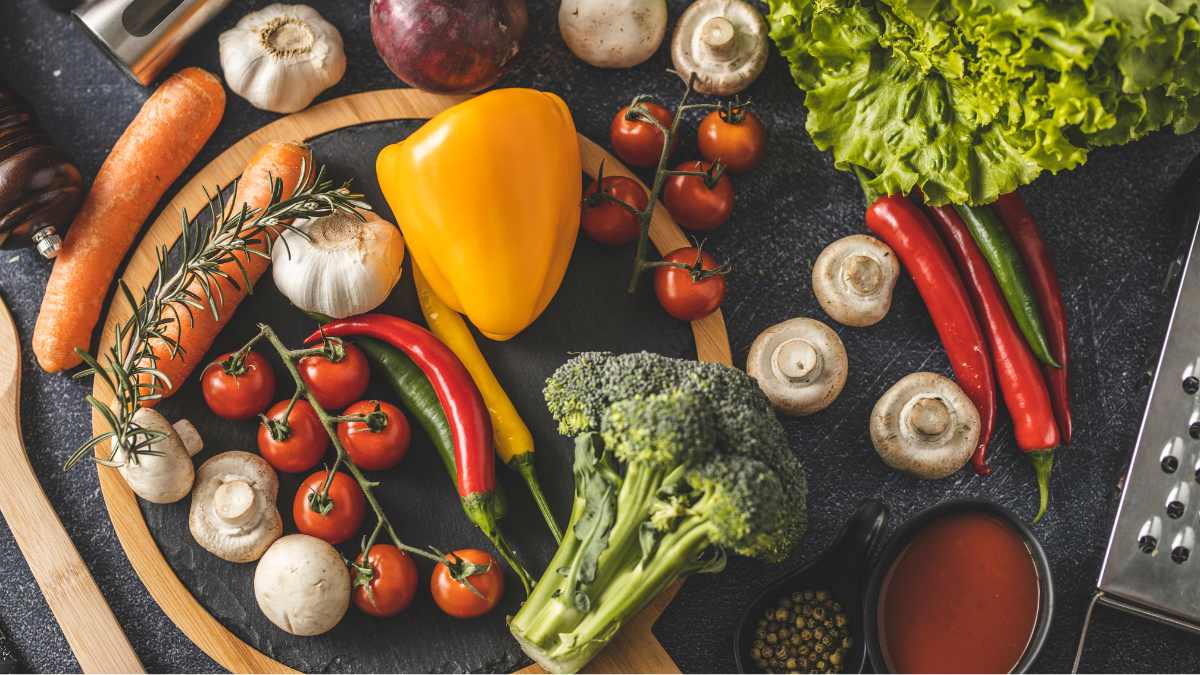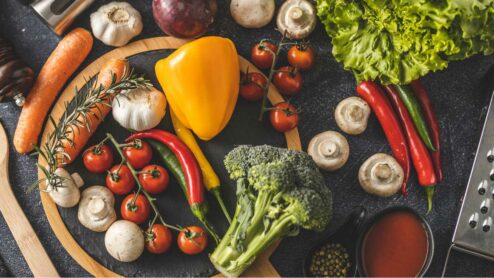Introduction:
In recent years, vegetarianism has gained significant popularity, driven by concerns for health, the environment, and animal welfare. One of the most common questions posed to vegetarians is, "Where do you get your protein?" This article aims to provide a comprehensive overview of the various sources of protein available to vegetarians, ensuring they meet their dietary needs without relying on animal products.
Understanding Protein Requirements for Vegetarians
Protein is an essential macronutrient that plays a critical role in building and repairing tissues, producing enzymes and hormones, and supporting overall bodily functions. For vegetarians, understanding their protein requirements is crucial to maintaining a balanced diet. The Recommended Dietary Allowance (RDA) for protein is approximately 46 grams per day for adult women and 56 grams per day for adult men. However, individual needs can vary based on factors such as age, activity level, and overall health.
Vegetarians must be mindful of incorporating a variety of protein sources to ensure they receive all nine essential amino acids, which are the building blocks of protein. While animal products typically contain all essential amino acids, many plant-based proteins are considered incomplete, meaning they lack one or more of these amino acids. By consuming a diverse range of plant-based foods, vegetarians can achieve a complete amino acid profile.
It’s also important to note that the bioavailability of plant-based protein can be lower than that of animal-based protein. This means that the body may not absorb and utilize plant protein as efficiently. To counteract this, vegetarians should aim to consume slightly higher amounts of protein than the RDA to compensate for the lower bioavailability.
Finally, vegetarians should pay attention to their overall dietary patterns, ensuring they consume a balanced mix of macronutrients and micronutrients. This holistic approach will help them meet their protein needs while also supporting their overall health and well-being.
Legumes: A Primary Source of Plant-Based Protein
Legumes, including beans, lentils, chickpeas, and peas, are a staple in many vegetarian diets due to their high protein content and versatility. For example, a cup of cooked lentils provides about 18 grams of protein, making it an excellent source for meeting daily protein requirements. Additionally, legumes are rich in fiber, iron, and other essential nutrients, contributing to a balanced diet.
Chickpeas, another popular legume, offer around 15 grams of protein per cooked cup. They can be used in various dishes, from hummus to salads, providing both protein and a delightful texture. Black beans, with approximately 15 grams of protein per cooked cup, are another versatile option that can be incorporated into soups, stews, and burritos.
Peas, including green peas and split peas, are also valuable protein sources. A cup of cooked green peas contains about 9 grams of protein, while split peas offer around 16 grams per cooked cup. These legumes can be used in soups, side dishes, and even as a base for plant-based burgers.
Incorporating a variety of legumes into a vegetarian diet not only ensures adequate protein intake but also provides a range of other nutrients. The high fiber content in legumes aids in digestion and helps maintain a healthy gut microbiome, while their iron content supports oxygen transport in the blood.
Nuts and Seeds: Compact Nutrient Powerhouses
Nuts and seeds are compact sources of protein and other essential nutrients, making them a valuable addition to a vegetarian diet. Almonds, for example, provide about 6 grams of protein per ounce (approximately 23 almonds). They are also rich in healthy fats, vitamin E, and magnesium, contributing to overall health.
Chia seeds, known for their high omega-3 fatty acid content, offer around 4 grams of protein per two tablespoons. These tiny seeds can be easily added to smoothies, yogurt, or oatmeal, enhancing both the protein content and nutritional profile of meals. Similarly, flaxseeds provide about 3 grams of protein per tablespoon and are an excellent source of fiber and lignans, which have antioxidant properties.
Pumpkin seeds are another protein-rich option, with approximately 7 grams of protein per ounce. They can be enjoyed as a snack or added to salads, granola, or baked goods. Sunflower seeds, offering around 5 grams of protein per ounce, are also versatile and can be incorporated into various dishes.
Walnuts, although slightly lower in protein with about 4 grams per ounce, are packed with omega-3 fatty acids and antioxidants, supporting heart health and reducing inflammation. By including a variety of nuts and seeds in their diet, vegetarians can boost their protein intake while benefiting from a range of other nutrients that support overall health.
Whole Grains: Combining Carbohydrates and Protein
Whole grains are often overlooked as protein sources, but they can significantly contribute to a vegetarian’s protein intake. Quinoa, for instance, is a complete protein, meaning it contains all nine essential amino acids. A cup of cooked quinoa provides about 8 grams of protein, making it a valuable addition to salads, bowls, and side dishes.
Farro, an ancient grain, offers around 6 grams of protein per cooked cup. It has a nutty flavor and chewy texture, making it a delicious and nutritious base for salads and grain bowls. Similarly, barley provides about 3.5 grams of protein per cooked cup and can be used in soups, stews, and pilafs.
Oats are another excellent source of protein, with about 6 grams per cooked cup. They are versatile and can be used in various forms, from traditional oatmeal to overnight oats and granola. Additionally, oats are rich in fiber, particularly beta-glucan, which supports heart health and helps regulate blood sugar levels.
Brown rice, while not as high in protein as some other grains, still contributes to overall protein intake with about 5 grams per cooked cup. Combining brown rice with beans or lentils can create a complete protein meal, ensuring all essential amino acids are consumed. Incorporating a variety of whole grains into a vegetarian diet not only boosts protein intake but also provides essential vitamins, minerals, and fiber.
Soy Products: Versatile and Protein-Rich Options
Soy products are among the most protein-dense options available to vegetarians. Tofu, made from soybeans, offers about 10 grams of protein per half-cup serving. It is incredibly versatile and can be used in a wide range of dishes, from stir-fries to smoothies, making it a staple in many vegetarian diets.
Tempeh, a fermented soy product, provides even more protein, with approximately 15 grams per half-cup serving. Its firm texture and nutty flavor make it an excellent meat substitute in sandwiches, salads, and stir-fries. The fermentation process also enhances the digestibility of tempeh and increases its nutritional value.
Edamame, young soybeans, are another protein-rich option, with about 17 grams of protein per cooked cup. They can be enjoyed as a snack or added to salads, rice bowls, and pasta dishes. Edamame is also a good source of fiber, vitamins, and minerals, contributing to a balanced diet.
Soy milk, a popular dairy alternative, provides around 7 grams of protein per cup. It can be used in the same way as cow’s milk, whether in coffee, smoothies, or baking. Fortified soy milk also offers additional nutrients such as calcium and vitamin D, supporting bone health. By incorporating a variety of soy products into their diet, vegetarians can easily meet their protein needs while enjoying diverse and flavorful meals.
Vegetables and Fruits with Notable Protein Content
While vegetables and fruits are not typically known for their protein content, some varieties do offer notable amounts. For example, broccoli provides about 4 grams of protein per cooked cup. It is also rich in vitamins C and K, fiber, and various antioxidants, making it a highly nutritious addition to any meal.
Spinach, another protein-containing vegetable, offers around 5 grams of protein per cooked cup. It can be used in salads, smoothies, and cooked dishes, contributing to overall protein intake while providing essential nutrients like iron and calcium. Similarly, Brussels sprouts provide about 4 grams of protein per cooked cup and are packed with vitamins, minerals, and fiber.
Asparagus is another vegetable with a decent protein content, offering about 4 grams per cooked cup. It is also a good source of vitamins A, C, and K, as well as folate. Incorporating asparagus into meals can enhance both the protein content and nutritional profile.
Among fruits, guava stands out with approximately 4 grams of protein per cup. It is also rich in vitamin C, fiber, and antioxidants, supporting overall health. While fruits are generally lower in protein compared to other food groups, including protein-rich fruits like guava can contribute to meeting daily protein needs.
Conclusion:
Meeting protein requirements on a vegetarian diet is entirely feasible with careful planning and a diverse range of plant-based foods. By incorporating legumes, nuts, seeds, whole grains, soy products, and certain vegetables and fruits, vegetarians can ensure they receive adequate protein and other essential nutrients. Understanding the protein content and nutritional benefits of these foods allows vegetarians to create balanced and satisfying meals that support their overall health and well-being.
More Information:
For further reading and detailed information on vegetarian protein sources, consider exploring the following resources:
- Harvard T.H. Chan School of Public Health – Protein: This page provides an overview of protein, including plant-based sources and their health benefits.
- Academy of Nutrition and Dietetics – Vegetarian Diets: This article discusses the nutritional considerations and protein sources for vegetarians.
- Healthline – Best Vegetarian Sources of Protein: A comprehensive list of high-protein vegetarian foods with detailed nutritional information.
- The Vegetarian Resource Group – Protein in the Vegan Diet: This resource provides an in-depth look at protein needs and sources for vegetarians and vegans.
- Mayo Clinic – Nutrition and Healthy Eating: Protein: Expert answers to common questions about vegetarian protein sources and dietary planning.


